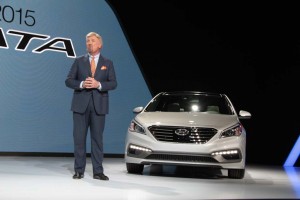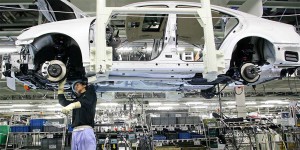
Hyundai let its U.S. Chief Dave Zuchowski, shown at the launch of the 2015 Sonata, amidst several changes the maker is tackling.
Sales slipping, profits tumbling, Hyundai is taking some drastic steps to shore things up.
Just days before the annual industry break, the Korean carmaker gave Dave Zuchowski, the CEO of its U.S. operations, his walking papers. But it has also been making a series of moves closer to home aimed at reining in spending.
Hyundai Motor Group CEOs are taking 10% pay cuts, according to a report by the Reuters news service, while the company is scaling back flights for Korean workers stationed abroad who normally head home for the holidays on the company’s expense.
Longer term, however, Hyundai will have to do more than just try to cost-cut its way to prosperity, a number of industry observers tell TheDetroitBureau.com.
(Management shake-up as Hyundai ousts top U.S. exec. Click Here for the story.)
“It doesn’t matter” who you have running things, or how much you cut costs, stressed analyst Dave Sullivan, of AutoPacific Inc., “if you don’t have the right product.”

Hyundai workers in Korea negotiated a new contract with raises and other increases. Other workers, top executives in particular, are taking pay cuts.
And that’s the bigger problem, most analysts warn. Hyundai currently has just two global SUV models: the Tucson and bigger Santa Fe. That’s a fraction of what key competitors, such as Toyota, Nissan, Ford and General Motors offer.
Hyundai also has no pickups in its line-up. Those trucks are a financial foundation for all four of those makers. The Korean carmaker has been working on a small, low-cost pickup based on a wildly popular show car, the Santa Cruz. But it has yet to make it into production three years after the concept was unveiled.
Hyundai was one of the few automakers to gain momentum during the global automotive downturn, but sales have been slipping for the last several years, a period in which conventional passenger cars have been losing ground in favor of light trucks. In turn, the company’s earnings have now slipped for four years in a row.
“We’re trying to address a mismatch between the market trend and our product line-up,” one Hyundai insider, told Reuters. “That’s a longer term plan. For now we’re trying to save every penny.”
The ouster of Zuchowski came as little surprise to industry observers. Hyundai has a history of keeping its executives on a short leash, especially foreign managers. The company declined to renew the contract of Zuchowski’s predecessor, John Krafcik, in 2013, even while Hyundai Motor America sales were strong.
(Hyundai electrifies with new Ioniq EV. Click Here for more.)
But Korean executives aren’t entirely immune from sharing the pain. They’re reportedly earning 10% less since pay cuts were initiated pay cuts in October. And there’ve been sharp cuts in executive travel that can mean being stuck in less expensive hotels or having to travel coach, rather than business class.
In some cases, Hyundai is even delaying replacing burned-out lights and other office expenditures are being put on hold.
Those aren’t unusual steps. During the Great Recession, Ford Motor Co. even delayed printing business cards for its employees. But Hyundai is still solidly in the black, despite its current troubles.
The moves at the Korean carmaker are as much as anything symbolic. And the company is limited in some areas. It recently agreed to a costly new contract with workers at its home market plants after they staged a series of strikes and slowdowns for several months. Korean autoworkers have a history of militancy that has largely wiped out the cost advantage companies like Hyundai once had over plants in Japan, Europe and North America.
It could take a while for Hyundai to turn things around. Ko Tae-bong, an automotive analyst at Hi Investment & Securities, expects Hyundai to see sales drop to 8 million this year. That would be its first decline since 1998, when it took over smaller Korean maker Kia.
The company does see a modest gain in 2017, Hyundai-Kia Executive Vice President and research head Park Hong-jae, telling reporters last week, “It was a difficult year this year. Things will get better.”
(Genesis pumps things up with G80 Sport. Click Here to check it out.)
But, according to Reuters, Hyundai’s optimism is tempered. It originally expected to see 2017 global sales jump to 8.35 million. It now expects something closer to 8.2 million. And with the shift from cars to light trucks spreading around the world, it likely won’t get things back on track until it can stretch its SUV line-up, a move that will likely take several more years.
